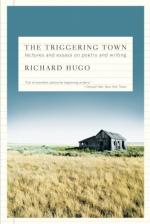
|
| Name: _________________________ | Period: ___________________ |
This test consists of 15 multiple choice questions and 5 short answer questions.
Multiple Choice Questions
1. One assumption says that the churches are always _____.
(a) Extreme.
(b) Full.
(c) Dirty.
(d) Empty.
2. What do the people in one assumption do to ward off boredom?
(a) Eat constantly.
(b) Build houses for the poor.
(c) Commit adultery.
(d) Drink constantly.
3. Hugo says that if one is a private poet, then one's vocabulary is limited to one's _____.
(a) Training.
(b) Criticism.
(c) Obsessions.
(d) Intellect.
4. The town druggist on an assumption is _____.
(a) A drug dealer on the side.
(b) An ex-football player.
(c) An alcoholic.
(d) A womanizer.
5. The purpose of the triggering town is to serve as a _____ for the poem.
(a) Literal setting.
(b) Place to leave bad ideas.
(c) Common ground.
(d) Base of operations.
6. Hugo says that once a language exists only to convey information, it is _____.
(a) Interesting.
(b) Dying.
(c) Dictating.
(d) Evolved.
7. Who does Hugo put in the silo in one of his poems?
(a) Babies.
(b) Large rats.
(c) Chorus girls.
(d) Soldiers.
8. Hugo advises that at all times, the student must keep his _____ on.
(a) Ability to copy.
(b) Game face.
(c) Convention bucking device.
(d) Crap detector.
9. Hugo believes that a poet must take _____of a triggering town.
(a) Total control.
(b) Emotional possession.
(c) Care.
(d) Stock.
10. Which Shakespeare play has Regan and Cornwall blinding Gloucester?
(a) Twelfth Night.
(b) Macbeth.
(c) King Lear.
(d) Hamlet.
11. At what age does Hugo start teaching?
(a) Forty.
(b) Fifty.
(c) Sixty-five.
(d) Twenty-five.
12. Hugo thinks that Roethke is too _____ for his own good.
(a) Detailed.
(b) Slothful.
(c) Arrogant.
(d) Competitive.
13. Hugo states that all art that has endured has an element of _____.
(a) Surprise.
(b) Plagiarism.
(c) Disguise.
(d) Schmaltz.
14. The grain elevator in one assumption is _____.
(a) Completely full.
(b) Silver.
(c) Rusted through.
(d) Lopsided.
15. Hugo advises that the hard work put in on the first poem is responsible for the _____ of the second.
(a) Problems.
(b) Sudden ease.
(c) Longer length.
(d) Lack of inspiration.
Short Answer Questions
1. Roethke is fond of quoting whose idea of "systematic derangement of the senses"?
2. Why does Hugo think his idea of the triggering town causes ideas for poems to come out more easily?
3. In one of Hugo's assumptions, _____ at the farmer's market is punishable by death.
4. Hugo maintains that once the poet has a certain amount of _____, one can forget it in the act of writing.
5. People who hated the town left long ago and are wealthy in ____ in one assumption.
|
This section contains 398 words (approx. 2 pages at 300 words per page) |

|




